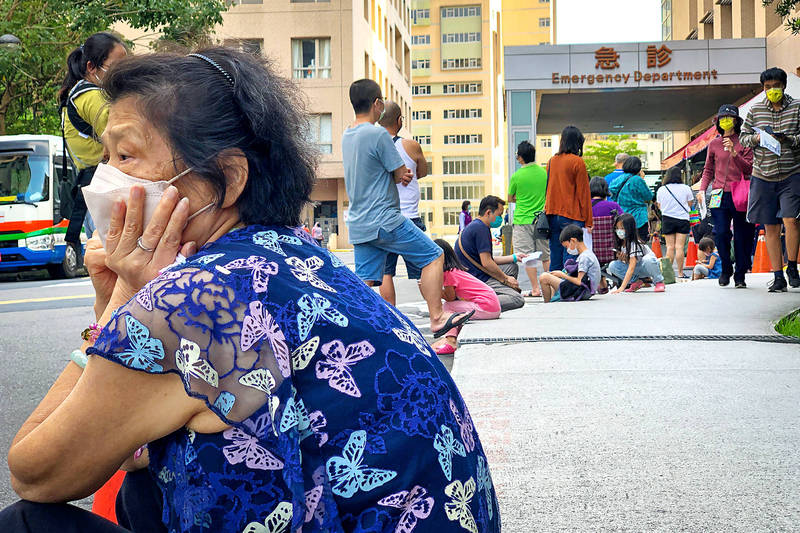《TAIPEI TIMES》 CECC eases isolation rule for close contacts of cases

People wait outside a hospital’s emergency department for medication in New Taipei City’s Jhonghe District yesterday, as hospitals are inundated with patients among soaring numbers of confirmed COVID-19 infections. Photo: CNA
NO ‘DIGITAL FENCE’: People who share a household with a confirmed case will have to isolate at home for three days and monitor their health for four more days
/ Staff writer, with CNA
Starting today, close contacts of a COVID-19 case will no longer be required to isolate unless they live under the same roof, the Central Epidemic Command Center (CECC) said yesterday.
The policy aims to protect the nation’s public health capacity, as the number of daily local COVID-19 cases have surpassed 45,000, Minister of Health and Welfare Chen Shih-chung (陳時中), who heads the center, told a daily briefing.
Close contacts who share a household or dormitory with a confirmed case will have to isolate at home for three days, after which they will be required to closely monitor their health for another four days, Chen said.
They will no longer be subject to the “digital fence system,” which uses a person’s mobile phone to monitor their location, the CECC said.
The policy also removes the isolation requirement for classmates or colleagues who are seated close to a confirmed case.
However, the center reiterated that such people are at high risk of contracting COVID-19.
If an employee who has not received three doses of a COVID-19 vaccine is identified as a close contact of a confirmed case at the workplace, they should self-isolate or work remotely for three days after their last contact with the infected person, Chen said.
After the three-day period, the contact should take a rapid COVID-19 test every other day for the next four days, he said.
However, if the contact had received a booster shot at least 14 days before their last contact with a case, they can go to work, but must observe self-health management for seven days after the date of their last contact, Chen said.
The digital monitoring system will remain in place for confirmed cases undergoing home quarantine and arrivals to Taiwan staying at quarantine facilities, the CECC said.
The center also reduced the quarantine period for asymptomatic or mild cases from 10 days to seven days, starting today. They must still undergo seven days of self-health management after quarantine.
The policy covers confirmed cases quarantining at home as well as mild or asymptomatic cases in hospitals or medically supported quarantine facilities and hotels, the CECC said.
Mild or asymptomatic cases in hospitals and medically supported quarantine facilities and hotels will be permitted to end quarantine at any point if they produce two negative rapid test results, or five days after the onset of symptoms or a first positive test result if they produce a single negative rapid test result.
Chen said the changes were made as the majority of people infected with the Omicron variant of SARS-CoV-2 experience mild or no symptoms.
Those with severe symptoms who have been hospitalized can exit quarantine when their symptoms ease and they produce a polymerase chain reaction test result that is either negative or has a cycle threshold value of at least 30, he said.
新聞來源:TAIPEI TIMES












